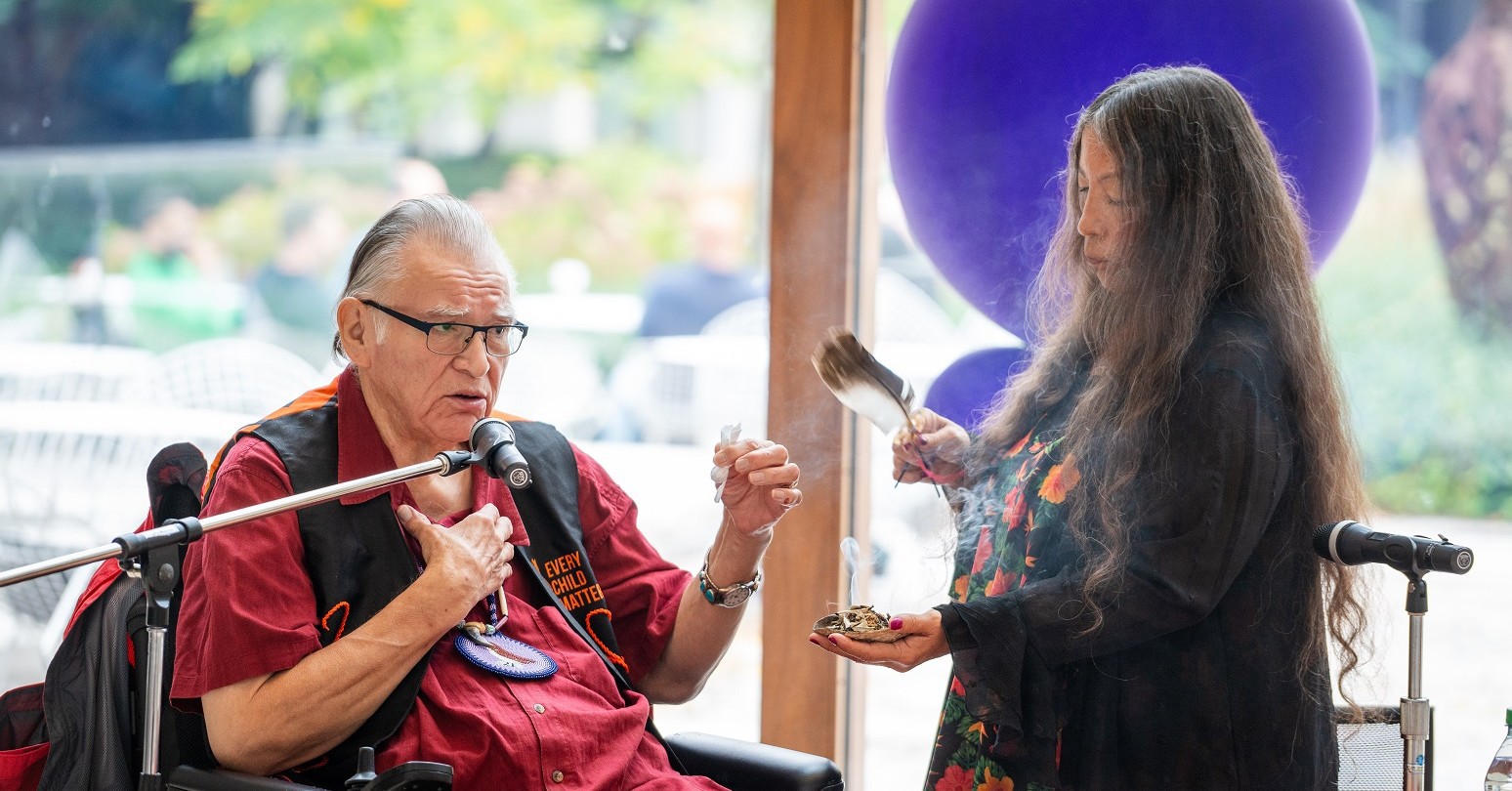Whether gaining wisdom from Indigenous Elders or learning about the history of Indigenous Canada, the Ivey community marked the National Day for Truth and Reconciliation (NDTR) with a focus on education this week.
Ivey’s HBA Association (HBAA) organized an Elders’ Circle for the Ivey community, which took place in Ivey’s Grand Hall and was hosted by Elders Dan and Marylou Smoke. Both Elders are respected teachers, activists, writers, and broadcasters who have worked to advance Indigenous rights, encourage healing, and build cross-cultural understanding across Canada.
HBA student Carol Guo, vice president of Equity, Diversity, and Inclusion with the HBAA, helped to organize the Elders’ Circle because she said it’s important for the Ivey community to reflect collectively on reconciliation.
“It’s our responsibility to acknowledge the responsibility we bear and learn about pathways forward,” she said. “I hope Mary Lou and Dan Smoke’s performance gave students a chance to engage and reflect meaningfully on reconciliation, as well as learn about Indigenous culture in a more intimate setting.”
The Ivey community was also encouraged to begin classes, meetings, and events with a land acknowledgement, wear orange t-shirts or ribbons throughout the week, and participate in events from Western University's Office of Indigenous Initiatives (OII).
One special event on campus this week was a screening of “The Nature of Healing,” a documentary about survivors of the Mohawk Institute, Canada’s first and longest-running residential school. The event included a Q&A with filmmaker Faith Howe and three Mohawk Institute survivors and was organized by deans across campus.
An online journey through Indigenous Canada
Another important way the community commemorated NDTR was by beginning a journey through Indigenous Canada via an online educational series. Ivey faculty and staff are taking The Path: Your Journey Through Indigenous Canada™, a self-paced program of videos, quizzes, and reflection questions that showcases the history of Indigenous peoples. The Path™ is already part of Ivey’s HBA1 curriculum and has been well-received by the students.
Although The Path™ is available to the Western University community through the OII, Ivey is the first to pilot it across the entire faculty, says Erin Huner, Ivey’s Director of Culture and Inclusion. She worked with Sara Mai Chitty, Curriculum and Pedagogy Advisor at OII, to design reflection questions specifically for Ivey faculty and staff, and worked with Ivey colleague, Amanda MacArthur, Learning Experience Designer, to build the online site that houses The Path™ as a self-directed learning journey. The reflection questions were designed to encourage people to put the principles of reconciliation into practice.
Indigenous perspectives on colonization
The Path™ offers an introduction to the defining moments in the history of Indigenous peoples as well as to treaty and land rights, which Huner said is particularly important since Western University is built upon the traditional lands of Indigenous peoples that are connected to the London Township and Sombra Treaties of 1796 and the Dish with One Spoon Covenant Wampum. She said this might be some community members’ first opportunity to hear from Indigenous peoples about what colonization and the history of colonization in Canada has meant, and the hope is that community members will be inspired to take action through the development of a practice of reconciliation.
“The goal is to move it from an idea – so reconciliation is not a concept – to a practice … how do we embed [practicing reconciliation] in the work we do here as an institution with our peers, but also when we think about our systems and processes,” said Huner. “Reconciliation is not a practice that happens on just one day, so how do we think about connecting this to the other 364 days that we inhabit this space?”
Bringing Indigenous issues into the classroom
And Ivey’s NDTR activities don’t tell the full story of what’s happening at the School in terms of learnings about Indigenous communities, says Huner. Even before the launch of NDTR, Ivey faculty have been doing research on Indigenous issues, including:
- Diane-Laure Arjaliès on how innovative new conservation bonds are bringing Western and Indigenous perspectives together;
- Oana Branzei on the importance of respecting Indigenous ways of thinking and being with nature in conservation efforts; and,
- Christian Dippel on the economic development of Indigenous communities, both in Canada and the U.S.
“We have faculty members at Ivey who are deeply committed to working on different aspects of thinking about Indigenous Canada and these scholars are, through their collaborative and community-focused projects, shifting the conversations around Ivey’s relationship with Indigenous communities. The important feature of this approach is that this learning makes it into our classrooms through their mentorship and guidance,” said Huner.
Additionally, Ivey Publishing offers a free case, Indigenous Peoples and the Land in Canada: An Introduction. The case is co-authored by Diane-Laure Arjaliès, Ivey postdoctoral scholar Julie Bernard, and Marek Brooking, a research assistant at Ivey who was part of the 2022 Head and Heart Indigenous Research Fellowship at Western University.
Continuing the learning activities
And since NDTR is just one step in the journey toward reconciliation, Ivey will keep the momentum going through other activities. One is an Indigenous song and story session with Mezzo-soprano Marion Newman and composer Ian Cusson in Ivey’s BMO auditorium on October 12. Newman and Cusson will perform songs based on poems by Cree/Métis poet Marilyn Dumont and then reflect on the process involved. The event will include HBA students and be open to Ivey faculty and staff as well as the Western community. Huner said the session is designed to be part of The Path™ Indigenous learning experience.



